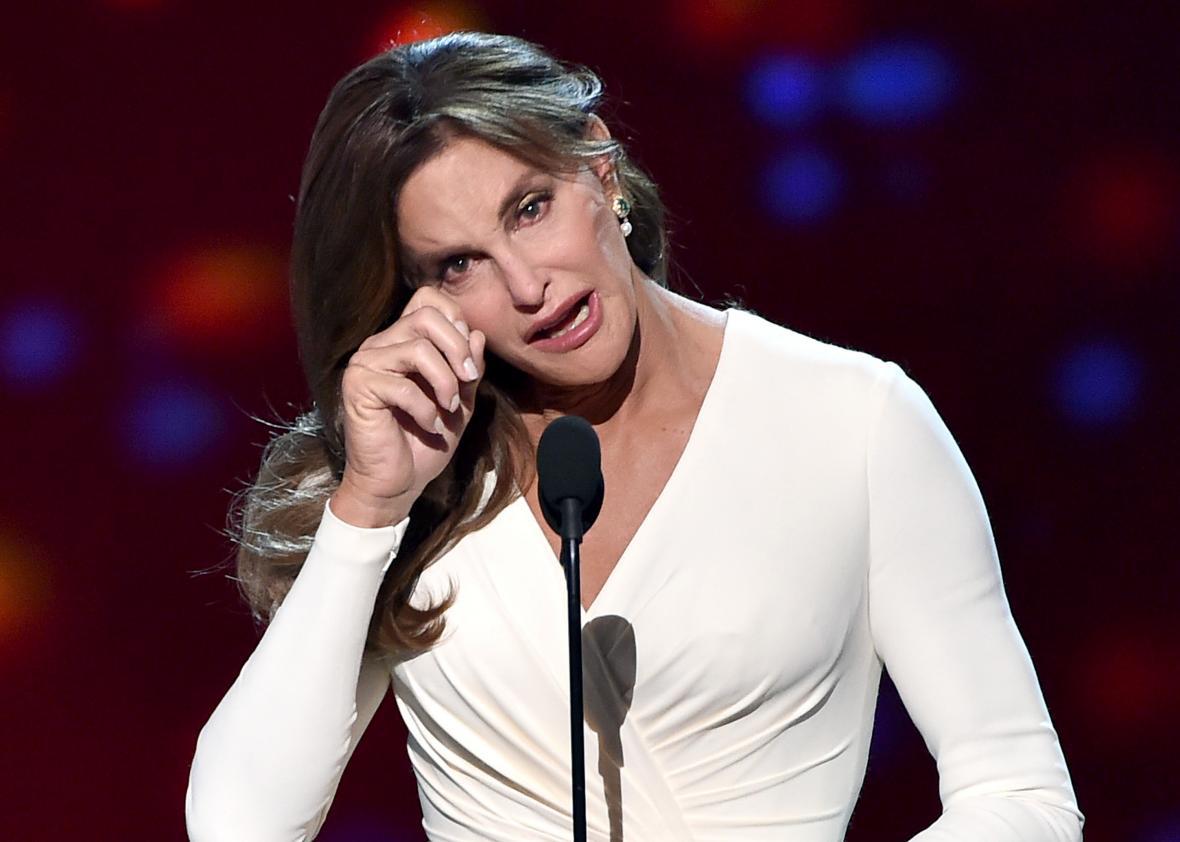After receiving the Arthur Ashe Courage Award at the ESPYs on Wednesday, Caitlyn Jenner gave a powerful speech in which she declared, “It is an honor to have the word ‘courage’ associated with my life.” But not everybody thinks Jenner’s very public gender transition displayed the kind of courage usually associated with the award. The Washington Post’s indispensible Justin William Moyer has a roundup of Jenner’s critics. Here’s veteran sportscaster Bob Costas’ take, which captures the gist of the criticism:
It strikes me that awarding the Arthur Ashe Award to Caitlyn Jenner is just a crass exploitation play. It’s a tabloid play. In the broad world of sports, I’m pretty sure they could’ve found someone—and this is not anything against Caitlyn Jenner—who was much [more] actively involved in sports, who would’ve been deserving of what that award represents. That’s not to say it doesn’t take some measure of personal courage to do what Caitlyn Jenner has done.
In fairness, Costas’ concern that Jenner has long been disconnected from the sports world is valid. But the thrust of his condemnation—that Jenner is personally gutsy, but undeserving of ESPY-level praise—is troubling. This view seems to be pretty common among a certain kind of sports commenter: straight men who have never before discussed trans issues but suddenly feel qualified to hold forth on the merits of Jenner’s bravery. I doubt Jenner cares much about this burgeoning subgenre of analysis. But it’s still worth exploring why the Costas criticism is so wrongheaded and narrow-minded.
Costas uses words—tabloid, exploitation, crass—to drive home the fact that Jenner is a celebrity and a frequent target of trashy gossip. That, of course, is true. But by using these negative terms, Costas implies that Jenner brought this negative attention on herself—and that praising her necessarily involves feeding into “tabloid” “exploitation.” This notion is profoundly offensive. As readers of Jenner’s Vanity Fair profile know, Jenner struggled with her gender identity for decades, even attempting to quietly transition in the 1980s. This time around, Jenner elected to take control of the inevitable publicity surrounding her transition, telling the true story before the tabloids made up their own.
Her fears were validated when In Touch ran a repulsively transphobic cover story imagining Jenner as a woman—before she publicly confirmed that she was transitioning. This nonsense was precisely what Jenner hoped to avoid by seizing her own narrative early on. Yes, Jenner was already a famous person who, on some level, must have enjoyed her celebrity. But she was also a modest, empathetic, devout churchgoer in her private life. You can view Jenner as a calculating publicity hound or a misunderstood former star struggling with gender dysphoria. Costas clearly sees her as the former. But that doesn’t mean Jenner somehow asked for endless tabloid speculation over her gender identity—or that she somehow deserved to receive constant tabloid scrutiny during her transition.
At bottom, Costas is essentially blaming Jenner for the tabloids’ interest in her. That is a regrettable error, but an easy one to make. Gay people, famous and obscure, are familiar with the threat of their sexuality eclipsing other rich aspects of their identity. The earliest openly gay stars—Elton John, Ellen DeGeneres—had to contend with fascination (and disgust) with their sexuality overshadowing their actual careers. Neither asked for the press to zero in on their sexuality, but it did—fiercely and unceasingly. Jenner is no more to blame for her ubiquity in the tabloids today than John and DeGeneres were decades ago.
For a certain kind of American—mostly those over a certain age—Caitlyn Jenner’s prominence is scary. Here is a woman who was once a famous man, who insists on drawing attention to her transition, and has elevated herself as a role model for other trans people. For those who ignored the existence of the trans community until now, Jenner’s high profile is unnerving. For people like Costas, the default mode is to assume that Jenner’s transition is yet another publicity stunt, a play for notoriety that belongs in the tabloids, not at the ESPYs. The apparent ubiquity of this assumption further demonstrates why Jenner’s campaign is so important. From the start, Caitlyn Jenner has presented herself as an educator. As Costas’ myopic criticism illustrates, America needs a lot of education.
